‘Sanctuary Solidarities’: Resources from the EARC Conference 2025
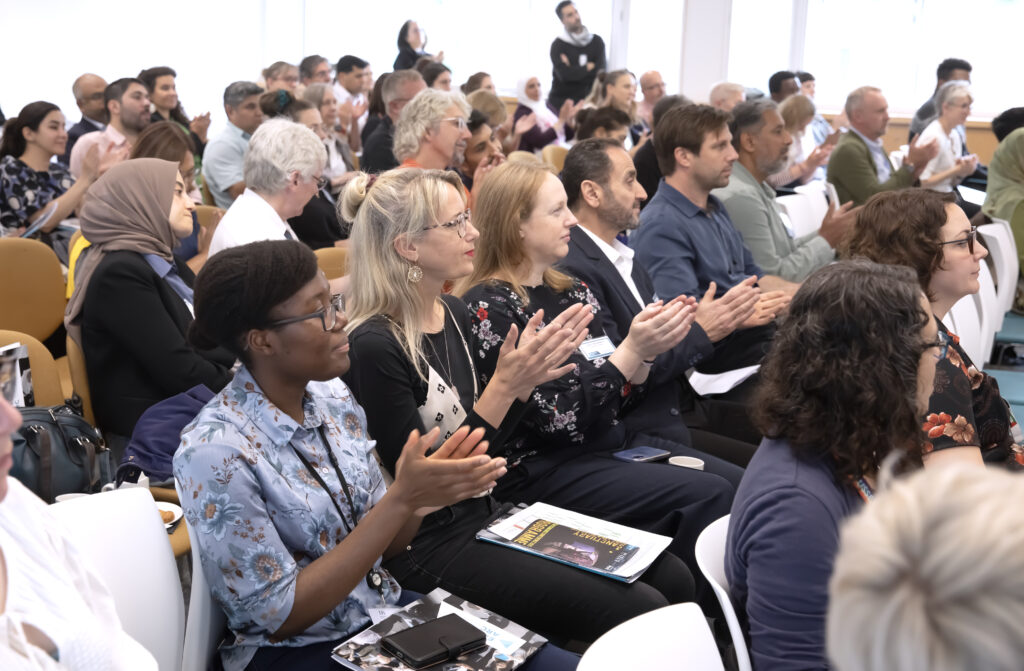
This year our conference focussed on ‘Sanctuary Solidarities’. Never has this been more important — but also more challenging — than now.
With the rise in far-right populism, violent conflict and the bolstering of borders, our conference this year looked at the part university staff and students can and should play in forging solidarities with those seeking sanctuary, but also at how they should participate in contested and increasingly polarised debates about migration.
To catch up with the presentations and discussions on the day, click on the sessions below, or browse the photos via the links on the right. Recordings from the sessions that took place in our plenary room will be available shortly.
-
 Vicky Tennant, UNHCR Representative to the United Kingdom, and Krish Kandiah, Founder and Director of the Sanctuary Foundation
Vicky Tennant, UNHCR Representative to the United Kingdom, and Krish Kandiah, Founder and Director of the Sanctuary Foundation In the last decade the number of people who have been forcibly displaced due to persecution, conflict, or violence has nearly doubled to 122.2 million, equating to approximately 1 in every 67 people on Earth.
As such the role of the UNHCR, the UN Refugee Agency, has never been more important. Since its foundation 75 years ago it has continued to deliver life-saving aid and protection in emergencies, advocate for improved asylum laws, and help find long-term solutions for those affected. It’s an essential safety net for those seeking sanctuary.
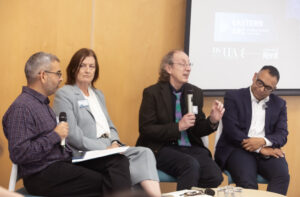 However, it cannot act alone. Addressing forced displacement requires coordinated and united efforts rooted in partnership across a range of actors and entities – international, national, community-based, academia, private sector, refugees themselves, and more. Such a ‘whole of society’ approach, outlined in the Global Compact on Refugees, is vital to provide help for those in need that will allow them to return home when the time is right or build a future in a country of safety. The Sanctuary Foundation does just that, offering compassion and practical aid to those fleeing persecution.
However, it cannot act alone. Addressing forced displacement requires coordinated and united efforts rooted in partnership across a range of actors and entities – international, national, community-based, academia, private sector, refugees themselves, and more. Such a ‘whole of society’ approach, outlined in the Global Compact on Refugees, is vital to provide help for those in need that will allow them to return home when the time is right or build a future in a country of safety. The Sanctuary Foundation does just that, offering compassion and practical aid to those fleeing persecution. In this keynote, against the backdrop of global forced displacement today, Vicky Tennant spoke about emerging challenges and evolving responses that can ensure host communities get the support they need and empower refugees to lead productive lives.
In this keynote, against the backdrop of global forced displacement today, Vicky Tennant spoke about emerging challenges and evolving responses that can ensure host communities get the support they need and empower refugees to lead productive lives.In turn, Dr Krish Kandiah outlined some of the work the Sanctuary Foundation has done within this framework, and the positive effect its work within communities has had for the life chances of refugees. He explored the shifting national narrative on immigration in general and asylum in particular and point to important ways civil society, the arts and business can help tell a better story about immigration and humanitarian resettlement.
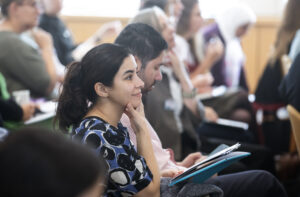 Together, they discussed their different perspectives, their commonalities and differences, and encouraged a dialogue with the audience to understand how, by working together, they can catalyse partnerships of hope.
Together, they discussed their different perspectives, their commonalities and differences, and encouraged a dialogue with the audience to understand how, by working together, they can catalyse partnerships of hope.- Vicky Tennant is the UNHCR Representative to the United Kingdom. Educated at the University of Essex and Queen’s University, Belfast, she is a member of the English Bar. She has worked for UNHCR since 2000 in countries including Pakistan, Afghanistan, Ethiopia, Somalia, Sudan, Myanmar and Syria.
- Dr Krish Kandiah OBE is Founder and Director of the Sanctuary Foundation. He is a social entrepreneur who has led the charge on mobilising civil society groups and churches as they have supported recent arrivals from Hong Kong, Afghanistan and Ukraine. He has helped to inspire and train thousands to care for vulnerable adults and children. He is a regular broadcaster on BBC Radio 2, 4 and GB News.
-
Ozgu Karakulak, Mirela Xheneti, Matilde Lucheschi and Rana Zayadin (University of Sussex), and Yevgeniia Gnatchenko (UEA)
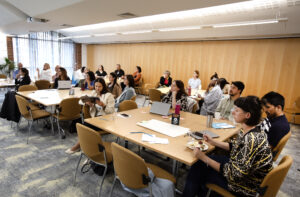 Having a stable source of income is essential for refugees to successfully settle and thrive in their host country. However, the support they get in developing the skills necessary to access the job market varies hugely and is dependent on both the place in which they settle and the sector in which they work.
Having a stable source of income is essential for refugees to successfully settle and thrive in their host country. However, the support they get in developing the skills necessary to access the job market varies hugely and is dependent on both the place in which they settle and the sector in which they work.It is also dependent on the skills and previous experience of the individuals, and those from an entrepreneurial background have a different set of challenges and opportunities from those seeking employment. It can feel like a lottery, and isn’t helped by Government guidance which is open to very different interpretations.
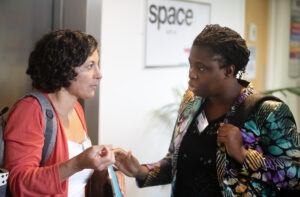 This session looked at the diverse support that is offered to refugees from local authorities, businesses and charities. It will explore the different experiences of institutions and individuals, employees and entrepreneurs. It identified good practice and offered practical tips to both refugees themselves, and those who are in a position to help and support them.
This session looked at the diverse support that is offered to refugees from local authorities, businesses and charities. It will explore the different experiences of institutions and individuals, employees and entrepreneurs. It identified good practice and offered practical tips to both refugees themselves, and those who are in a position to help and support them. The speakers have experience of working with a range of stakeholders, and outlined the projects they led and the outcomes from them, before opening up to questions and a wider discussion based on their findings.
The speakers have experience of working with a range of stakeholders, and outlined the projects they led and the outcomes from them, before opening up to questions and a wider discussion based on their findings.- Ozgu Karakulak, Mirela Xheneti, Matilde Luscechi and Rana Zayadin (University of Sussex) worked with The Launchpad Collective, a Brighton-based charity that supports refugee job seekers. Their project sought to develop the entrepreneurial skills of refugees through practical workshops, as well as bringing in local businesses to understand their needs and how they can be met by refugees.
- Yevgeniia Gnatchenko (University of East Anglia) has worked with Ukrainian entrepreneurs, exploring their intentions and motivations, and comparing the experience of those who came to the UK after the Russian invasion of 2022, and those who had settled in the country prior to it.
Resources
-
Geena Whiteman (British Council), Tahir Zaman (University of Sussex), Tom Parkinson (University of Kent), and Miassar al-Hassan (University of Leeds/Sham University)
 What does it mean to be a University of Sanctuary in the UK when the overwhelming majority of displaced people live in the Global South? This session looked at this question exploring how universities are increasingly working with partner institutions in regions of conflict, and will identify the challenges and opportunities facing those forging these partnerships.
What does it mean to be a University of Sanctuary in the UK when the overwhelming majority of displaced people live in the Global South? This session looked at this question exploring how universities are increasingly working with partner institutions in regions of conflict, and will identify the challenges and opportunities facing those forging these partnerships.It began by outlining the wider context for such partnership, focussing particularly on a report undertaken by the British Council, Higher Education Partnerships in Conflict-Affected Regions, which explored examples of partnerships in Afghanistan, Ethiopia, Sudan, Iraq, Palestine and Ukraine.
The study found that such partnerships were vital for the development of human capital and for advancing equality, diversity, and inclusion values, as well as contributing to a culture of peacebuilding and reconciliation and supporting the development of peace.
 It then examined a project in detail: the development of Sham University in Syria. 50% of Sham’s student base is drawn from local internally-displaced people (IDP) camps, and the remainder come from towns in Azaz and surrounding areas. Colleagues at Sussex and Kent worked with their counterparts at Sham to develop the necessary governance, curricula, training, and accreditation to enable the university to function, grow and engage with the international higher education community.
It then examined a project in detail: the development of Sham University in Syria. 50% of Sham’s student base is drawn from local internally-displaced people (IDP) camps, and the remainder come from towns in Azaz and surrounding areas. Colleagues at Sussex and Kent worked with their counterparts at Sham to develop the necessary governance, curricula, training, and accreditation to enable the university to function, grow and engage with the international higher education community. The final part of the session allowed delegates to consider some of the ideas and issues raised, and to discuss ways in which their own work can help to build similar partnerships with other universities in regions of conflict.
The final part of the session allowed delegates to consider some of the ideas and issues raised, and to discuss ways in which their own work can help to build similar partnerships with other universities in regions of conflict.- Geena Whiteman (British Council) is a Senior Project Manager in the Insight Hub at the British Council. She wrote the report on Higher Education Partnerships in Conflict-Affected Regions.
- Tahir Zaman (University of Sussex) is Associate Professor in Human Geography in the School of Global Studies at Sussex. He has an interest in refugee agency and alternative socio-cultural understandings of refuge during times of mass-displacement. He co-led on developing the partnership with Sham University.
- Tom Parkinson (University of Kent) is a Reader at the Centre for the Study of Higher
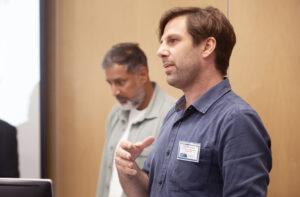 Education. His research focuses on global disparities in access to opportunity and resources in higher education and the relationship between higher education, society, the individual and the state. He co-led the partnership with Sham University.
Education. His research focuses on global disparities in access to opportunity and resources in higher education and the relationship between higher education, society, the individual and the state. He co-led the partnership with Sham University. - Miassar al-Hassan (University of Leeds/Sham University) is a visiting fellow at the University of Leeds and was former Rector of Sham University.
Resources
-
Ratna Jan Bibi (The Hera Project), Edina Husanovic (University of Brighton), Angeliki Varakis-Martin (University of Kent), Kaveh Abbasian (University of Kent), Anna Oggero (PROJEKT EUROPA) , Francisca Stangel (independent), Ismael Nchoutnsu Nsangou (University of Kent)
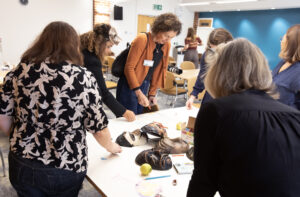 Creative workshops can be powerful tools to help understand and share the experiences of those seeking sanctuary. However, such workshops require very careful planning, from securing the funding necessary to make them happen, to choosing an appropriate venue and facilitator, to recruiting participants, embedding trust, and safeguarding the legacy.
Creative workshops can be powerful tools to help understand and share the experiences of those seeking sanctuary. However, such workshops require very careful planning, from securing the funding necessary to make them happen, to choosing an appropriate venue and facilitator, to recruiting participants, embedding trust, and safeguarding the legacy.This session heard from two projects that have successfully navigated this space to produce impactful, meaningful and powerful workshops. The Art for Belonging project, part of the wider work of the Hera initiative in Brighton, used music, drawing and storytelling to explore sanctuary; In Canterbury, the University of Kent hosted PROJEKT ENCOUNTER, a preexisting programme from PROJEKT EUROPA, developing it further using masks and film-making to create a collaborative community grounded in solidarity.
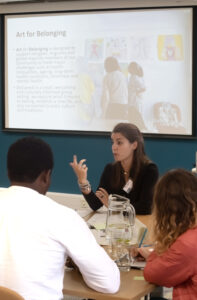 It started by hearing from both of these projects to understand how they came about, how they worked in practice, and what the outcomes were. This led to a discussion to identify some of the practicalities that future organisers of such workshops would have to consider, such as questions of trust, resources, participants’ needs, safeguarding, co-creation, context and location. Those attending the session were encouraged to engage with the presenters and with each other in talking about those elements that are most relevant to them, and steps that can be taken to prepare for them.
It started by hearing from both of these projects to understand how they came about, how they worked in practice, and what the outcomes were. This led to a discussion to identify some of the practicalities that future organisers of such workshops would have to consider, such as questions of trust, resources, participants’ needs, safeguarding, co-creation, context and location. Those attending the session were encouraged to engage with the presenters and with each other in talking about those elements that are most relevant to them, and steps that can be taken to prepare for them.The session finished with a brief creative exercise, to give participants a practical experience of activities that were used in one of the projects. There was then an opportunity, at lunch (13:30-14:00) to either:
- Continue these activities, with the space to explore them further;
- Watch the co-produced film that resulted from PROJEKT ENCOUNTER.
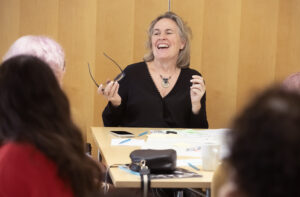 Ratna Jan Bibi (the Hera Project) is a Creative Programmer for the Hera (Healing, Expressive and Recovery Arts) Project
Ratna Jan Bibi (the Hera Project) is a Creative Programmer for the Hera (Healing, Expressive and Recovery Arts) ProjectEdina Husanovic (University of Brighton) is a researcher, educator and a multimedia artist, and a Lecturer in Arts and Media at the University of Brighton. She has worked on the Hera Project.
Angeliki Varakis-Martin (University of Kent) is a Lecturer in Drama and Theatre whose research focuses on masked performance and its contemporary applications. She has published widely on the use of masks in modern productions of Greek drama and has been engaged in practice-based projects exploring their creative potential.
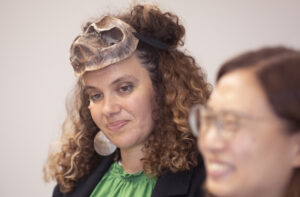 Kaveh Abbasian (University of Kent) is a scholar and filmmaker. His works have been screened in film festivals and exhibitions worldwide, and he is the former director of programming for the London Kurdish Film Festival.
Kaveh Abbasian (University of Kent) is a scholar and filmmaker. His works have been screened in film festivals and exhibitions worldwide, and he is the former director of programming for the London Kurdish Film Festival.Anna Oggero (PROJEKT EUROPA) is the Executive Producer at PROJEKT EUROPA a charity dedicated to transforming narratives around migration and displacement by supporting, developing, and producing the work of migrants and migrant artists in the UK. As a freelance creative producer, Anna has worked on critically acclaimed productions across the UK. Her practice is rooted in telling migration stories and is driven by a deep commitment to equity and systemic change in the arts.
 Francisca Stangel (independent) is a clown, theatre maker and applied theatre practitioner. She has worked with refugees, asylum seekers and migrants with organisations such as Clowns Without Borders and is a company director of award-winning Acá Theatre.
Francisca Stangel (independent) is a clown, theatre maker and applied theatre practitioner. She has worked with refugees, asylum seekers and migrants with organisations such as Clowns Without Borders and is a company director of award-winning Acá Theatre.Ismael Nchoutnsu Nsangou (University of Kent) is a sanctuary scholar, originally from Cameroon. He is currently studying drama at the University.
Resources
-
Mohammad Naeim Maleki (UEA), Rohullah Hakimi (UEA), Saifullah Danishwar (UEA) and Ali Ahmadi (UEA)
 This practice-sharing story addressed a critical but underexplored aspect of the University of Sanctuary (UoS) work: how refugee and asylum-seeking students support one another across cohorts through informal, peer-led models of solidarity. While university-led sanctuary initiatives are rightly recognised as essential and supportive, recent research also highlights the vital role of student peer support and the value of lived experience in shaping inclusive sanctuary spaces in higher education (Speed et al., 2020).
This practice-sharing story addressed a critical but underexplored aspect of the University of Sanctuary (UoS) work: how refugee and asylum-seeking students support one another across cohorts through informal, peer-led models of solidarity. While university-led sanctuary initiatives are rightly recognised as essential and supportive, recent research also highlights the vital role of student peer support and the value of lived experience in shaping inclusive sanctuary spaces in higher education (Speed et al., 2020).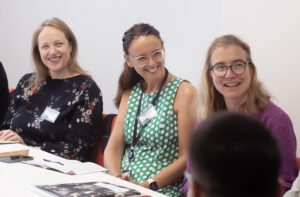 This panel presented the lived experiences and practices of sanctuary students at the University of East Anglia (UEA). Panellists represented different cohorts (2021/22 to 2024/25), highlighting how earlier arrivals connected to the UoS team, accessed support, and later became contributors themselves.
This panel presented the lived experiences and practices of sanctuary students at the University of East Anglia (UEA). Panellists represented different cohorts (2021/22 to 2024/25), highlighting how earlier arrivals connected to the UoS team, accessed support, and later became contributors themselves.The panel explored the following themes:
- Inclusive engagement models: mentoring, mental health support, and access to university facilities
- Practical challenges faced by newcomers: housing, family responsibilities, children’s schooling, and financial hardship
- Evolving chains of engagement: how each cohort of sanctuary students built upon the efforts of those before them
The session also addressed cultural sensitivities, such as how some sanctuary students may feel more comfortable sharing concerns with peers first. This ensures that UoS support remains culturally responsive to individual comfort levels.
This practice-sharing panel ultimately highlighted how a community of sanctuary students can provide effective, culturally nuanced support for newcomers, and how this evolving “chain of solidarity” contributes meaningfully to the UoS mission. It emphasiseed both the practical and emotional dimensions of solidarity-building within higher education institutions.
- Rohullah Hakimi is a PhD student at the UEA’s School of Global Development. His research
 focuses on the localisation of Community-Based Education (CBE) in Afghanistan, exploring its challenges, opportunities and implications. His broader interests include educational inequality, localisation and community participation in education in conflict-affected contexts. He previously worked in education programme management, quality assurance and monitoring with international NGOs and donors in Afghanistan.
focuses on the localisation of Community-Based Education (CBE) in Afghanistan, exploring its challenges, opportunities and implications. His broader interests include educational inequality, localisation and community participation in education in conflict-affected contexts. He previously worked in education programme management, quality assurance and monitoring with international NGOs and donors in Afghanistan. - Mohammad Naeim Maleki is a postgraduate researcher at the UEA’s School of Education and Lifelong Learning. His research focuses on the intersection of literacies, identity construction, agency and empowerment among male adult literacy learners in conflict affected states. He taught literacy and languages in different countries. He has worked with UN agencies in conflict areas, focusing on education and peace. Naeim has published research papers on teaching methodologies, literacies and education.
- Ali Ahmadi is an incoming PhD student at Anglia Ruskin University, where he will research refugee higher education with a focus on the support services offered by Universities of Sanctuary and the experiences of refugee students engaging with these supports. His broader interests include refugee housing, health inequalities, and access to education for displaced communities. He also works directly with refugee organisations such as City of Sanctuary, supporting refugees in accessing essential services including housing and Employment supports.
- Saifullah Danishwar is an MSc student in Impact Evaluation at the UEA’s School of Global
 Development. He is an economist and a finance and fundraising expert with extensive experience in the development sector, having worked with international NGOs and consultancies in Afghanistan, Pakistan, the USA, Yemen, and Ukraine. His research interests focus on trade policy and its economic impacts, with a broader interest in international development, economic policy, and the financial sustainability of programs in fragile and conflict-affected settings.
Development. He is an economist and a finance and fundraising expert with extensive experience in the development sector, having worked with international NGOs and consultancies in Afghanistan, Pakistan, the USA, Yemen, and Ukraine. His research interests focus on trade policy and its economic impacts, with a broader interest in international development, economic policy, and the financial sustainability of programs in fragile and conflict-affected settings.
-
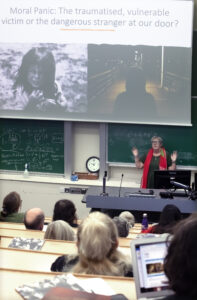 Rachel Larkin (University of Sussex) and Bridget Ng’andu (University of Kent)
Rachel Larkin (University of Sussex) and Bridget Ng’andu (University of Kent)Solidarity is grounded in human-to-human connections but these are undermined by political and social narratives that dehumanise those who seek sanctuary.
This session explored ideas of moral panic that construct migrant groups through a narrative of fear and consider how these may influence human interactions.
It drew on learning from bringing together students, academics, campaigners and people with lived experience of forced migration to explore ways of creating and holding spaces where difficult conversations about migration can be had.
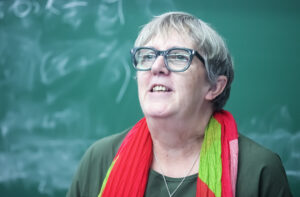 It considered some of the challenges and tensions that can emerge in these spaces and how they could be navigated. Through the shared experience of the speakers, they explored ideas of how to hear different narratives/conversations and how these could be challenged through interactive activities which seek to ‘re-humanise’ people who seek sanctuary.
It considered some of the challenges and tensions that can emerge in these spaces and how they could be navigated. Through the shared experience of the speakers, they explored ideas of how to hear different narratives/conversations and how these could be challenged through interactive activities which seek to ‘re-humanise’ people who seek sanctuary.- Rachel Larkin (University of Sussex) is an Assistant Professor in Social Work. Her research explores state responses to children and young people in forced migration and how this relates to professional frameworks and commitments to social justice and human rights. She has a particular interest in girlhood and how gender and sexuality impact the experiences of young migrants in social work services.
- Bridget Ng’andu (University of Kent) is a Lecturer in Social Work. Having worked as a frontline
 Social Worker and Senior Practitioner, her research interests now focus on children and families, specifically issues around child sexual exploitation and race, safeguarding and unaccompanied asylum seekers, social work activism, alternative ways of social work practice, social work diversity and international social work practice.
Social Worker and Senior Practitioner, her research interests now focus on children and families, specifically issues around child sexual exploitation and race, safeguarding and unaccompanied asylum seekers, social work activism, alternative ways of social work practice, social work diversity and international social work practice.
Resources
-
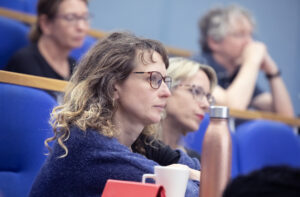 S. Nikeaateghad (University of Essex), C. Ferstman (University of Essex), G.S. Gilbert (University of Essex) and R.R. Luthra (University of Essex)
S. Nikeaateghad (University of Essex), C. Ferstman (University of Essex), G.S. Gilbert (University of Essex) and R.R. Luthra (University of Essex)The trauma of forced displacement starts from the moment the person seeking asylum decides to flee, but it is not resolved the moment they arrive in a potential country of asylum. This panel explored how mental health issues arise throughout the refugee journey from both sociological and legal perspectives.
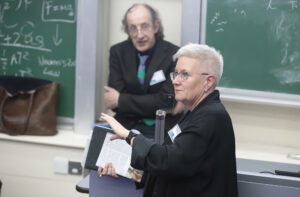 It started with S. Nikeaateghad on how for people seeking asylum, “finding home” is not a single moment of arrival but a protracted and uncertain process of negotiating recognition within unfamiliar and hostile legal, social, and economic landscapes – “home” is not merely a physical shelter but a symbolic and affective anchor of identity, meaning, and relational belonging. Displacement disrupts not only geographical rootedness but also the psychosocial structures through which individuals situate themselves in the world. While voluntary and community-based support networks can foster a sense of belonging, they also operate within what participants experience as moral economies of care, systems in which gratitude and compliance are often expected, and where the ability to express dissatisfaction risks being construed as ingratitude.
It started with S. Nikeaateghad on how for people seeking asylum, “finding home” is not a single moment of arrival but a protracted and uncertain process of negotiating recognition within unfamiliar and hostile legal, social, and economic landscapes – “home” is not merely a physical shelter but a symbolic and affective anchor of identity, meaning, and relational belonging. Displacement disrupts not only geographical rootedness but also the psychosocial structures through which individuals situate themselves in the world. While voluntary and community-based support networks can foster a sense of belonging, they also operate within what participants experience as moral economies of care, systems in which gratitude and compliance are often expected, and where the ability to express dissatisfaction risks being construed as ingratitude.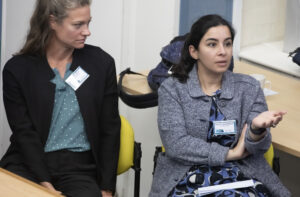
The second presentation by C. Ferstman looked at how the detention of migrants and refugees can significantly and negatively impact mental health, leading to increased rates of depression, anxiety, and post-traumatic stress disorder. Furthermore, detention environments can exacerbate existing mental health conditions due to the lack of control, oppressive atmosphere, and limited access to specialized treatment. In certain circumstances this can rise to the level of cruel, inhuman or degrading treatment or punishment, if not torture, yet receiving countries including the UK continue to detain as a matter of routine refugees and other migrants regardless of their exposure to past trauma and irrespective of the significant mental health risks posed by the detention. The paper considered why the law that should protect vulnerable people from harm, has ceased to function.
 R.R. Luthra’s work on how locational characteristics affect the mental health of refugees, focusing specifically on the roles of co-ethnic networks and local hostility towards refugees in the Netherlands, forms the third presentation. Refugee mental health remains underexplored, often relying on generalized survey data that neglects the unique experiences of refugee populations. This study sought to illuminate how locational characteristics affect the mental health of refugees, focusing specifically on the roles of co-ethnic networks and local hostility towards refugees in the Netherlands.
R.R. Luthra’s work on how locational characteristics affect the mental health of refugees, focusing specifically on the roles of co-ethnic networks and local hostility towards refugees in the Netherlands, forms the third presentation. Refugee mental health remains underexplored, often relying on generalized survey data that neglects the unique experiences of refugee populations. This study sought to illuminate how locational characteristics affect the mental health of refugees, focusing specifically on the roles of co-ethnic networks and local hostility towards refugees in the Netherlands.Finally, GS Gilbert looked at how trauma and mental health can play a role when it would otherwise be safe for refugees to return, but for some that is never possible because of what drove them to flee or the conditions in the country of nationality during its transitional phase, drawing on international refugee law and international human rights law.
- Sayna Nikeaateghad is a Doctoral Candidate, Department of Sociology, University of Essex
- Carla Ferstman is a Professor, Essex Law School and Director of the Essex Human Rights Centre
- Renee Luthra is a Professor, Department of Sociology, Deputy Director, ESRC Research Centre on Micro-Social Change (MiSoC) (Joint work with Hiromi Yumoto (Senior Research Officer, MiSoC) and Ceren Ozgen (Associate Professor in Economics, Birmingham)).
- Geoff Gilbert is Sérgio Vieira de Mello Professor of International Human Rights & Humanitarian Law, Essex Law School and Human Rights Centre; Senior Adviser to PPLA, Division of International Protection, UNHCR.
Resources
-
 Zahid Pranjol (University of Sussex) and Aleks Palanac (University of Leicester)
Zahid Pranjol (University of Sussex) and Aleks Palanac (University of Leicester)The UN has described the targeting of educational establishments in Gaza as ‘scholasticide’: 658,000 students currently have no access to full time education, and 51 university buildings have been destroyed and a further 57 damaged, with the last remaining higher education institution in the territory, Israa University, demolished in January last year. As a result, a generation of students has had its education–and resultant careers–significantly delayed or destroyed.
 How can UK universities help them to continue their education? This session explored some of the current initiatives that are in place, and will discuss what more could or should be done. This included the question of whether it is more appropriate to help academics and students by offering scholarships in the UK, or to heed the unprecedented call of the Emergency Committee of Universities in Gaza from May 2024 to provide support and solidarity to the institutions themselves as they struggle to survive in the face of systematic attempts to erase them or provide resources and distance-learning for those still in Gaza. It also explored the potential for adopting various advocacy and campaigning initiatives within our universities, such as the Palestinian Campaign for the Academic and Cultural Boycott of Israel (PACBI)
How can UK universities help them to continue their education? This session explored some of the current initiatives that are in place, and will discuss what more could or should be done. This included the question of whether it is more appropriate to help academics and students by offering scholarships in the UK, or to heed the unprecedented call of the Emergency Committee of Universities in Gaza from May 2024 to provide support and solidarity to the institutions themselves as they struggle to survive in the face of systematic attempts to erase them or provide resources and distance-learning for those still in Gaza. It also explored the potential for adopting various advocacy and campaigning initiatives within our universities, such as the Palestinian Campaign for the Academic and Cultural Boycott of Israel (PACBI) The session leads provided the context of the current situation in Palestine, before outlining some of the work they have been involved in. The session finished by opening up the room for participants to discuss the different options, opportunities, needs and challenges, and how the UK academic community can best support those seeking to continue their education in Palestine.
The session leads provided the context of the current situation in Palestine, before outlining some of the work they have been involved in. The session finished by opening up the room for participants to discuss the different options, opportunities, needs and challenges, and how the UK academic community can best support those seeking to continue their education in Palestine.- Zahid Pranjol (University of Sussex) is Associate Dean (Education & Students) for the Faculty of Science, Engineering and Medicine at the University of Sussex, and has been instrumental in forging a partnership with the University College of Applied Sciences in Gaza, providing distance teaching and online resources to first, second and third year medical students, as well as advocating for other medical schools to do the same.
- Aleks Palanac (University of Leicester) leads the Sanctuary Seekers’ Unit, having originally taught English for Speakers of Other Languages (ESOL) in community settings in 2004. She moved on to teaching English for Academic Purposes (EAP), and identified a need for EAP among refugee background students wishing to access university. She has since taken a lead role in developing and implementing widening participation opportunities for them through such initiatives as the RefugEAP Programme and the RefugEAP Network.
Resources
-
Moira Dustin (University of Sussex) and Mohammad Naeim Maleki (UEA)
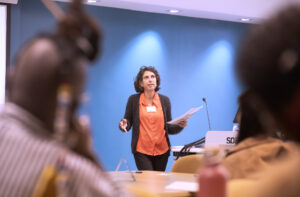 Whilst ethically-based research on and with refugees is of fundamental importance to knowledge creation, policymaking and practical action, the academic frameworks in place to protect refugee rights and encourage their involvement in the research process, as well as the wider drivers for research in the UK, do not necessarily achieve these ends.
Whilst ethically-based research on and with refugees is of fundamental importance to knowledge creation, policymaking and practical action, the academic frameworks in place to protect refugee rights and encourage their involvement in the research process, as well as the wider drivers for research in the UK, do not necessarily achieve these ends.This session explored practical steps that can be taken by those undertaking research on refugees. It looked at the ‘positionality’ of both researcher and researched, and sought to understand the dynamics at work between them, recognising that the stories told by refugees are not just ‘data points’, but rather a bridge to solidarity, agency and benefit for those involved.
 The session leads brought different but complementary perspectives to bear on the issue. Moria Dustin has explored queer identities amongst amongst exiled Iranian people living in Türkiye, the UK and Canada; and Naeim Maleki, who began his research looking at identity, masculinity and agency in adult male learners in Afghanistan, became an asylum seeker himself during the process, which forced him to rethink assumptions about researcher neutrality, introducing new forms of vulnerability and insight.
The session leads brought different but complementary perspectives to bear on the issue. Moria Dustin has explored queer identities amongst amongst exiled Iranian people living in Türkiye, the UK and Canada; and Naeim Maleki, who began his research looking at identity, masculinity and agency in adult male learners in Afghanistan, became an asylum seeker himself during the process, which forced him to rethink assumptions about researcher neutrality, introducing new forms of vulnerability and insight. The session used Mentimeter to start a dialogue with the audience. It began by outlining the positions and experiences of each of the leads, who then took part in a panel session that highlighted some of the practical steps they took in addressing the challenges they faced. It then moved to explore these with the audience, seeking to better understand a range of perspectives and knowledge. It finished by identifying some tools by which researchers can more equitably and creatively work with refugees to better understand their journey.
The session used Mentimeter to start a dialogue with the audience. It began by outlining the positions and experiences of each of the leads, who then took part in a panel session that highlighted some of the practical steps they took in addressing the challenges they faced. It then moved to explore these with the audience, seeking to better understand a range of perspectives and knowledge. It finished by identifying some tools by which researchers can more equitably and creatively work with refugees to better understand their journey.- Mohammad Naeim Maleki is a postgraduate researcher at the UEA’s School of Education and
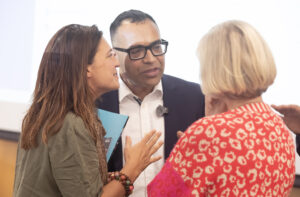 Lifelong Learning. His research focuses on the intersection of literacies, identity construction, agency and empowerment among male adult literacy learners in conflict affected states. He taught literacy and languages in different countries. He has worked with UN agencies in conflict areas, focusing on education and peace. Naeim has published research papers on teaching methodologies, literacies and education.
Lifelong Learning. His research focuses on the intersection of literacies, identity construction, agency and empowerment among male adult literacy learners in conflict affected states. He taught literacy and languages in different countries. He has worked with UN agencies in conflict areas, focusing on education and peace. Naeim has published research papers on teaching methodologies, literacies and education. - Moira Dustin is an Assistant Professor in the School of Law, Politics and Sociology at the University of Sussex, where she also leads on Knowledge Exchange and Engagement for the School. In 2021, Moira launched Women in Refugee Law (WiRL) with Christel Querton (University of the West of England). The network brings together asylum claiming and refugee women, senior and early career scholars, practitioners, policymakers and activists from around the globe to re-centre the study of refugee women within refugee law, policy and practice.
- Mohammad Naeim Maleki is a postgraduate researcher at the UEA’s School of Education and
-
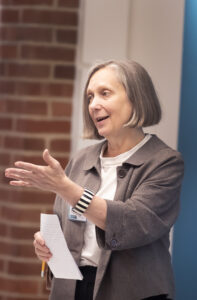 Divya Jose (Refugee Education UK), Corinne Squire (University of Bristol) and Mir Abdullah Miri (University of Bath)
Divya Jose (Refugee Education UK), Corinne Squire (University of Bristol) and Mir Abdullah Miri (University of Bath)The UNHCR has estimated that only 7% of refugees have access to higher education, compared to 42% for non-refugees.
A report from the University of Bristol, published earlier this year, identified a range of reasons why this was the case in the UK, including a hostile political environment, financial constraints, lack of information and coordination, and inflexibility over non-UK qualifications.
Refugee Education UK (REUK) works to overcome these barriers. It provides information and support for refugees seeking to access higher and further education in the UK, including signposting scholarships.
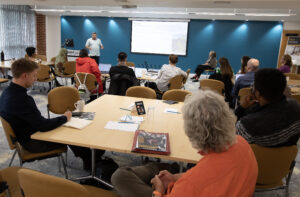 Divya Jose, Youth Advocacy Manager at REUK, discussed these practical interventions with one of the Bristol report’s authors, Corinne Squire. They each talked about their work and the conclusions from it, before opening up the discussion to a panel of stakeholders.
Divya Jose, Youth Advocacy Manager at REUK, discussed these practical interventions with one of the Bristol report’s authors, Corinne Squire. They each talked about their work and the conclusions from it, before opening up the discussion to a panel of stakeholders.Participants then had the opportunity to discuss these conclusions in small groups, to talk about their experiences and to share their knowledge, and to build on these to develop practical proposals for supporting refugees to access higher and further education.
- Divya Jose (Refugee Education UK) is a Youth Advocacy Manager. She provides research and
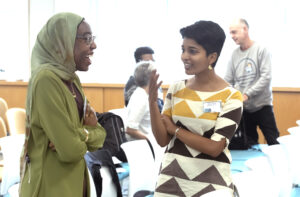 advocacy support for REUK’s projects, and has a particular interest in forced migration, women and children in conflict, and restorative justice.
advocacy support for REUK’s projects, and has a particular interest in forced migration, women and children in conflict, and restorative justice. - Corinne Squire (University of Bristol) is a Chair in Global Inequalities and leads the Open Learning Initiative, or OLIve, a national online programme, supporting people from refugee backgrounds who want to move into higher education.
- Mir Abdullah Miri (University of Bath) is a refugee scholar with a PhD in English Language Teaching, now pursuing a second PhD in Refugee Education at the University of Bath, where he is also a lecturer in the Department of Education. His extensive research and advocacy are dedicated to improving educational access and equity for refugees, migrants and people in crisis and challenging contexts.
Resources
- Divya Jose (Refugee Education UK) is a Youth Advocacy Manager. She provides research and
-
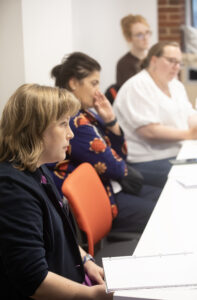 Jo Wilding (University of Sussex) and Steven Martin (Channel Monitoring Project)
Jo Wilding (University of Sussex) and Steven Martin (Channel Monitoring Project)Refugees, as well as the groups that support them, are often disadvantaged because they don’t have access to either legal services or robust evidence that may support their case for asylum.
Most of the Eastern Arc region is a ‘legal aid desert’, and this is particularly acute on its south and east coasts. As a result refugees and others have little access to social welfare and immigration legal advice and representation. Even where legal support is available, they may not be made aware of their right to access it. For those who do get legal support, their representatives may not have access to data that will validate their claims and strengthen their cases.
 This session heard from two people who are working to make hidden data and knowledge visible, accessible and usable, mapping legal aid provision across the UK, and bringing together a wealth of data to help evidence cross-Channel migration and interaction.
This session heard from two people who are working to make hidden data and knowledge visible, accessible and usable, mapping legal aid provision across the UK, and bringing together a wealth of data to help evidence cross-Channel migration and interaction.Having set out the context for their work, they explored some key questions leading on from it: what data are necessary and appropriate to support refugees in making their cases? How should they be presented? And what tools would be most beneficial for people to access them?
Participants in the session were invited to explore these questions, as well as sharing their own knowledge and experience, and thereby allowing a diverse range of stakeholders to learn from each other through a shared solidarity: refugees and community groups, academics and researchers, policymakers, politicians, charities and authorities.
- Jo Wilding (University of Sussex) is an Associate Professor in Law. A former barrister, she holds an ESRC New Investigator Grant looking at the indicators of social welfare legal advice need, the availability of advice provision and barriers to provision across the whole UK.
- Steven Martin (Channel Monitoring Project) is a Senior Research Fellow and has undertaken a wide range of refugee solidarity work in Greece, Belgium and the West Bank, and co-founded CMP to provide evidence to the UN and UK Government in order to hold border authorities to account.
Resources
-
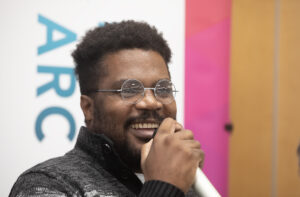 Mike Collyer (University of Sussex) and colleagues
Mike Collyer (University of Sussex) and colleaguesThis session took the form of a roundtable involving participants from a range of Brighton based organisations, including refugee community groups, all of whom contribute to make the city of a more welcoming place. THey considered what it means in practical terms for Brighton to be a City of Sanctuary and what kind of enabling policy environment is required to facilitate the work of these organisations. How can we ensure that this makes the city a more welcoming place for refugees and asylum seekers and a better place to live for everyone?
- Mike Collyer is Professor of Geography at the Sussex Centre for Migration Research. He is a
 political geographer with an interest in the relationship between people on the move and state institutions. His books include Migration (with Michael Samers) and Emigration Nations. He has held visiting fellowships around the world and was a Fulbright Scholar at the University of Washington. He currently chairs the Independent Advisory Group on Country of Origin Information, within the Office of the UK’s Chief Inspector of Borders and Immigration. He also chairs Sanctuary on Sea, Brighton’s City of Sanctuary group..
political geographer with an interest in the relationship between people on the move and state institutions. His books include Migration (with Michael Samers) and Emigration Nations. He has held visiting fellowships around the world and was a Fulbright Scholar at the University of Washington. He currently chairs the Independent Advisory Group on Country of Origin Information, within the Office of the UK’s Chief Inspector of Borders and Immigration. He also chairs Sanctuary on Sea, Brighton’s City of Sanctuary group..
- Mike Collyer is Professor of Geography at the Sussex Centre for Migration Research. He is a
